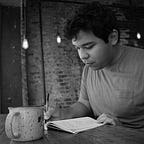Discerning Between Your Strengths and Weaknesses
By Cesar Romero
Whenever you find yourself on the side of the majority, it is time to pause and reflect. Mark Twain
Start a business.
Get a job.
Go to college.
Take this class.
Buy a house.
Do X because everyone else is doing it.
These are some of the things that people will tell you as if they know what’s best for you.
Everybody wants to tell you how to live your life but it’s only a reflection of their own thinking, not yours.
Nobody knows what’s best for you…..except you.
The main challenge today is gathering the courage to discern between your strengths and weaknesses; between what’s meaningful to you and what isn’t.
What exactly is discernment anyways?
Discernment is our ability to see our own truth, and not the one others want us to see.
Discernment is our own moral compass that help us decide between right and wrong.
In a world that is constantly pushing other people’s agendas as the number one priority, our ability to discern between what matters and what doesn’t has never been so important than ever.
Why is discernment so important to become a better leader/entrepreneur/employee/[Insert whatever you want to call yourself]?
Discernment and self-awareness go hand-in-hand.
If you want to become better at discerning, you need to become more self-aware.
And someone that is self-aware of his strengths and weaknesses, is someone who can maximize effectiveness and influence others.
There Is No Discernment In The Majority
The problem with following the conventional path is that there is no discernment
In a conventional path, society decides for you what’s right and wrong.
Outsourcing your discernment is easy because it’s less risk for you; if it doesn’t work out you can blame someone else.
Go to school, get a job, buy a house, get married, have kids, retire.
This is the path we are sold since very early on in life as the fail-proof path to success and happiness.
If we try to question it we get frowned upon by society.
At what point do we stop and ask ourselves “is this really for me?”; “does this align with my passion, purpose, and values?”
Who gets to decide between what’s good and bad for you?
Definitely not the majority.
Only you have the answer to that.
How do you develop better discernment skills?
Through applied experience.
You don’t know something it’s good or bad for you until you give it a try.
Can you turn your idea into a business?
Will this company hire you?
Are you the right fit for the job?
Can you get a discount on your next coffee?
Is the girl or guy willing to go on a date with you?
Go ahead and give it a shot.
We don’t really know the answers to these and many more questions until we put ourselves out there and start taking action.
Experience helps you develop your intuition and rational thought, and when you combine all 3 of these elements, your ability to discern improves.
The Biggest Benefit Of Discernment
Better opportunities!
When you are able to discern between what’s important to you and evaluate your options for maximum impact, you will constantly find yourself at the right place and right time.
Better discernment starts with self-awareness.
One tool that I always use and go back to it every month is the questionnaire in the last chapter of “Think And Grow Rich” by Napoleon Hill.
It has helped me to know more about myself and improve my self-awareness. I highly recommend you give it a try.
And remember, don’t let anyone else decide what’s good for you.
Only YOU know the answer to that.
Thanks for reading!
Let’s Connect Deeper.
If you enjoyed it, please let me know by clicking the heart button below or leaving a comment. It would mean the world to me.
